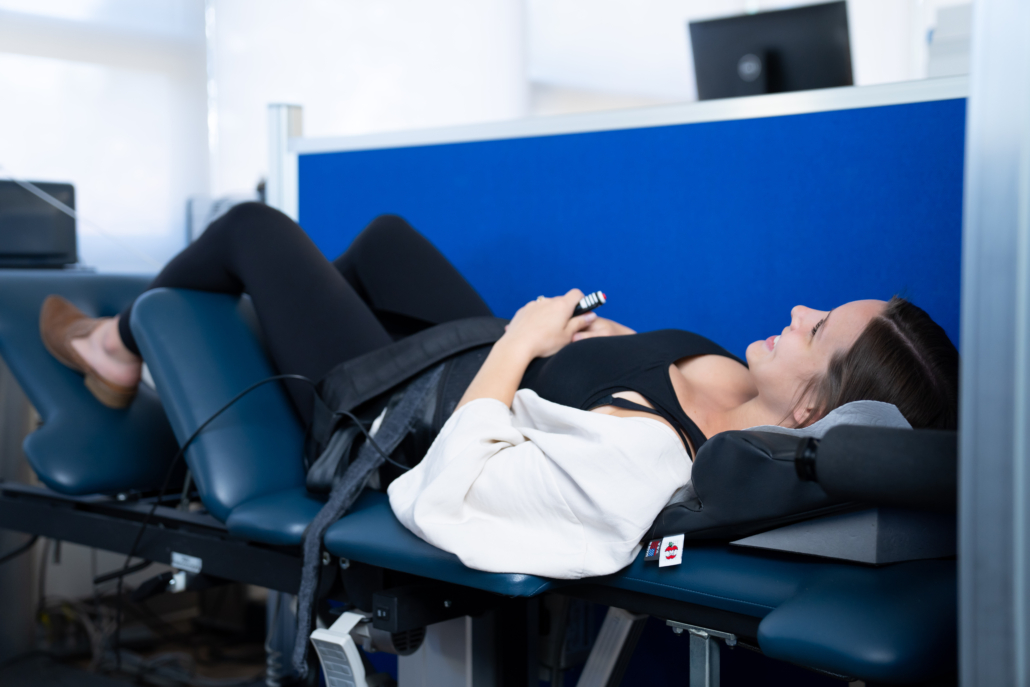Spinal Decompression
What is Spinal Decompression?
Non-surgical spinal decompression therapy is designed to alleviate compression and pain associated with disc and joint disorders. Spinal decompression therapy is both effective and safe for managing chronic spinal conditions, without the risks typically associated with medications, surgical interventions, or anesthesia.
With such a non-invasive treatment, it typically requires minimal time away from work or recovery, and many experience long-lasting relief from their symptoms.
How Does Spinal Decompression Work?
Spinal decompression therapy is delivered using an advanced, FDA-cleared machine that gently stretches the spine and decompresses the discs. Unlike traditional traction devices, spinal decompression machines can detect muscle resistance to pulling forces, allowing them to adjust and cycle the stretch accordingly, minimizing resistance. This process involves little to no discomfort for the patient, as the machine effectively alleviates pressure on the discs, promoting healing.
A crucial aspect of non-surgical spinal decompression therapy is its slow, controlled stretching, which creates a vacuum effect that helps reposition bulging disc material, reducing pain and facilitating recovery.
Spinal decompression therapy has demonstrated a high success rate in treating pain related to herniated or bulging discs, even in cases where previous surgical interventions have failed.
What Causes Disc Problems?
For clarity, the intervertebral discs serve as cushion-like structures between the vertebrae, preventing bone-on-bone contact and providing the necessary flexibility for safe movement. When these discs become injured or degenerate, it often results in persistent pain and limited mobility.
Ruptured disc material can impinge on a nerve, leading to significant discomfort. It is important to understand that disc tissue is among the slowest healing tissues in the body; therefore, untreated disc issues are likely to deteriorate rather than improve.
In daily life, a typical disc injury or degenerative disc condition is continually aggravated by normal movements and the downward pressure of body weight. Consequently, it is difficult for discs to heal on their own. This situation is akin to someone fracturing their foot and continuing to walk on it, preventing proper recovery.
If you were to sustain a foot fracture, you could easily immobilize it in a cast and use crutches to facilitate healing. Unfortunately, it is not possible to completely refrain from using your back or neck. Even during bed rest, you still rely on your back and neck muscles every time you move. Additionally, inactivity can weaken the back muscles, increasing the risk of re-injury upon resuming normal activity. For optimal healing of the disc, it is essential to alleviate pressure from the spine—an ongoing challenge due to the constant gravitational force acting on the discs throughout daily life.
Conditions that Spinal Decompression has helped:
Spinal decompression therapy can be a safe treatment for the following spinal conditions:
- Herniated discs
- Bulging discs
- Arm/leg numbness or pain
- Nerve damage from compression
- Degenerative disc disease
- Spondylolisthesis
- Facet syndrome
- Back or neck pain
- Stenosis
- Failed back surgery
Is Spinal Decompression Right for You?
Determining whether spinal decompression therapy is an appropriate treatment for you begins with a comprehensive evaluation of your medical history, followed by a focused examination. If further diagnostic imaging, such as x-rays, MRI/CT scans, or electrical diagnostic evaluation is deemed necessary, these will be arranged.
Once the relevant information has been collected, the doctor will meet with you to discuss the findings, and let you know if you are a candidate for non-surgical spinal decompression, and other treatment options.


